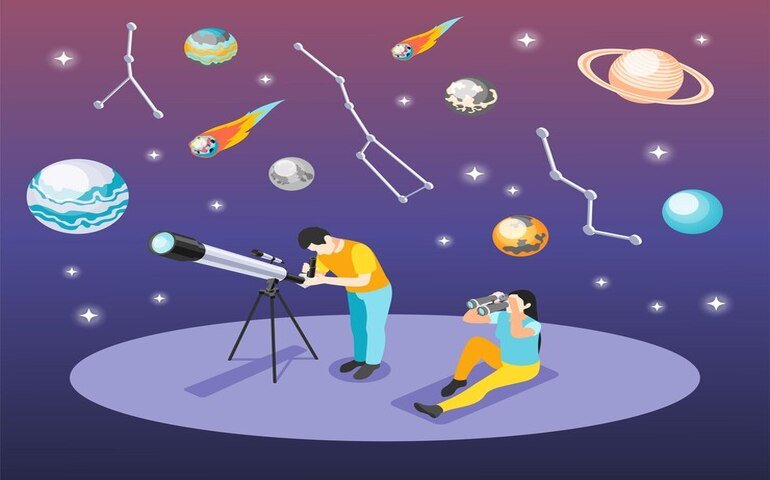Course Features
Price
Study Method
Online | Self-paced
Course Format
Reading Material - PDF, article
Duration
5 hours, 5 minutes
Qualification
No formal qualification
Certificate
At completion
Additional info
Coming soon
- Share
Overview
Astronomy is the oldest natural science, offering insights into the origins of the universe, the formation of celestial bodies, and the possibility of life beyond Earth. The Astronomy Level 8 Advanced Diploma provides an advanced understanding of astrophysical concepts, observational techniques, and theoretical cosmology.
The course begins with an Introduction to Astronomy, covering the historical evolution of astronomy, the structure of the universe, and essential tools used by astronomers.
The Solar System module delves into planetary formation, moons, asteroids, comets, and meteoroids, exploring both classical planetary science and recent discoveries about exoplanets and outer solar system bodies.
A key component of this diploma is Stellar Astronomy, where students will study star formation, stellar life cycles, black holes, neutron stars, and binary star systems. The Sun, as our closest star, is also examined in depth.
The Cosmology module explores the Big Bang Theory, dark matter, dark energy, and the ultimate fate of the universe, equipping students with the knowledge to understand the largest-scale structures and forces shaping the cosmos.
In Galaxies and Extragalactic Astronomy, students will study different galaxy types, galaxy clusters, quasars, and the mysterious nature of active galactic nuclei.
One of the most fascinating aspects of this course is Astrobiology and the Search for Extraterrestrial Life. This module investigates the conditions required for life, the Drake Equation, the Fermi Paradox, and ongoing missions searching for habitable planets.
For those interested in practical astronomy, the course covers Observational Techniques such as telescopic observations, astrophotography, photometry, and spectroscopy, providing students with skills to analyze celestial objects and record astronomical phenomena.
The diploma also examines Space Exploration and Future Prospects, covering historical space missions, current space exploration efforts, colonization possibilities, and the role of artificial intelligence in space science.
By the end of the course, students will have developed a strong foundation in astronomy, astrophysics, and space exploration, enabling them to pursue further studies, engage in independent research, or contribute to astronomy education and public outreach.
✔ Educators and science communicators who want to teach astronomy at an advanced level.
✔ Students and professionals in physics, space science, or engineering looking to specialize in astronomy.
✔ Space industry professionals, researchers, and engineers involved in planetary science, astrophysics, or space exploration.
✔ No prior experience in astronomy is required, as the course covers all fundamental and advanced topics.
Graduates of this course can pursue roles as:
✔ Astronomy Educators or Science Communicators
✔ Astrophotographers and Observational Astronomers
✔ Planetarium and Museum Science Presenters
✔ Researchers and Consultants in Space Science
✔ Space Mission Analysts or Science Writers
This diploma also serves as an excellent foundation for further studies in astrophysics, cosmology, or space exploration.
Who is this course for?
Astronomy is the oldest natural science, offering insights into the origins of the universe, the formation of celestial bodies, and the possibility of life beyond Earth. The Astronomy Level 8 Advanced Diploma provides an advanced understanding of astrophysical concepts, observational techniques, and theoretical cosmology.
The course begins with an Introduction to Astronomy, covering the historical evolution of astronomy, the structure of the universe, and essential tools used by astronomers.
The Solar System module delves into planetary formation, moons, asteroids, comets, and meteoroids, exploring both classical planetary science and recent discoveries about exoplanets and outer solar system bodies.
A key component of this diploma is Stellar Astronomy, where students will study star formation, stellar life cycles, black holes, neutron stars, and binary star systems. The Sun, as our closest star, is also examined in depth.
The Cosmology module explores the Big Bang Theory, dark matter, dark energy, and the ultimate fate of the universe, equipping students with the knowledge to understand the largest-scale structures and forces shaping the cosmos.
In Galaxies and Extragalactic Astronomy, students will study different galaxy types, galaxy clusters, quasars, and the mysterious nature of active galactic nuclei.
One of the most fascinating aspects of this course is Astrobiology and the Search for Extraterrestrial Life. This module investigates the conditions required for life, the Drake Equation, the Fermi Paradox, and ongoing missions searching for habitable planets.
For those interested in practical astronomy, the course covers Observational Techniques such as telescopic observations, astrophotography, photometry, and spectroscopy, providing students with skills to analyze celestial objects and record astronomical phenomena.
The diploma also examines Space Exploration and Future Prospects, covering historical space missions, current space exploration efforts, colonization possibilities, and the role of artificial intelligence in space science.
By the end of the course, students will have developed a strong foundation in astronomy, astrophysics, and space exploration, enabling them to pursue further studies, engage in independent research, or contribute to astronomy education and public outreach.
✔ Educators and science communicators who want to teach astronomy at an advanced level.
✔ Students and professionals in physics, space science, or engineering looking to specialize in astronomy.
✔ Space industry professionals, researchers, and engineers involved in planetary science, astrophysics, or space exploration.
✔ No prior experience in astronomy is required, as the course covers all fundamental and advanced topics.
Graduates of this course can pursue roles as:
✔ Astronomy Educators or Science Communicators
✔ Astrophotographers and Observational Astronomers
✔ Planetarium and Museum Science Presenters
✔ Researchers and Consultants in Space Science
✔ Space Mission Analysts or Science Writers
This diploma also serves as an excellent foundation for further studies in astrophysics, cosmology, or space exploration.
Requirements
Astronomy is the oldest natural science, offering insights into the origins of the universe, the formation of celestial bodies, and the possibility of life beyond Earth. The Astronomy Level 8 Advanced Diploma provides an advanced understanding of astrophysical concepts, observational techniques, and theoretical cosmology.
The course begins with an Introduction to Astronomy, covering the historical evolution of astronomy, the structure of the universe, and essential tools used by astronomers.
The Solar System module delves into planetary formation, moons, asteroids, comets, and meteoroids, exploring both classical planetary science and recent discoveries about exoplanets and outer solar system bodies.
A key component of this diploma is Stellar Astronomy, where students will study star formation, stellar life cycles, black holes, neutron stars, and binary star systems. The Sun, as our closest star, is also examined in depth.
The Cosmology module explores the Big Bang Theory, dark matter, dark energy, and the ultimate fate of the universe, equipping students with the knowledge to understand the largest-scale structures and forces shaping the cosmos.
In Galaxies and Extragalactic Astronomy, students will study different galaxy types, galaxy clusters, quasars, and the mysterious nature of active galactic nuclei.
One of the most fascinating aspects of this course is Astrobiology and the Search for Extraterrestrial Life. This module investigates the conditions required for life, the Drake Equation, the Fermi Paradox, and ongoing missions searching for habitable planets.
For those interested in practical astronomy, the course covers Observational Techniques such as telescopic observations, astrophotography, photometry, and spectroscopy, providing students with skills to analyze celestial objects and record astronomical phenomena.
The diploma also examines Space Exploration and Future Prospects, covering historical space missions, current space exploration efforts, colonization possibilities, and the role of artificial intelligence in space science.
By the end of the course, students will have developed a strong foundation in astronomy, astrophysics, and space exploration, enabling them to pursue further studies, engage in independent research, or contribute to astronomy education and public outreach.
✔ Educators and science communicators who want to teach astronomy at an advanced level.
✔ Students and professionals in physics, space science, or engineering looking to specialize in astronomy.
✔ Space industry professionals, researchers, and engineers involved in planetary science, astrophysics, or space exploration.
✔ No prior experience in astronomy is required, as the course covers all fundamental and advanced topics.
Graduates of this course can pursue roles as:
✔ Astronomy Educators or Science Communicators
✔ Astrophotographers and Observational Astronomers
✔ Planetarium and Museum Science Presenters
✔ Researchers and Consultants in Space Science
✔ Space Mission Analysts or Science Writers
This diploma also serves as an excellent foundation for further studies in astrophysics, cosmology, or space exploration.
Career path
Astronomy is the oldest natural science, offering insights into the origins of the universe, the formation of celestial bodies, and the possibility of life beyond Earth. The Astronomy Level 8 Advanced Diploma provides an advanced understanding of astrophysical concepts, observational techniques, and theoretical cosmology.
The course begins with an Introduction to Astronomy, covering the historical evolution of astronomy, the structure of the universe, and essential tools used by astronomers.
The Solar System module delves into planetary formation, moons, asteroids, comets, and meteoroids, exploring both classical planetary science and recent discoveries about exoplanets and outer solar system bodies.
A key component of this diploma is Stellar Astronomy, where students will study star formation, stellar life cycles, black holes, neutron stars, and binary star systems. The Sun, as our closest star, is also examined in depth.
The Cosmology module explores the Big Bang Theory, dark matter, dark energy, and the ultimate fate of the universe, equipping students with the knowledge to understand the largest-scale structures and forces shaping the cosmos.
In Galaxies and Extragalactic Astronomy, students will study different galaxy types, galaxy clusters, quasars, and the mysterious nature of active galactic nuclei.
One of the most fascinating aspects of this course is Astrobiology and the Search for Extraterrestrial Life. This module investigates the conditions required for life, the Drake Equation, the Fermi Paradox, and ongoing missions searching for habitable planets.
For those interested in practical astronomy, the course covers Observational Techniques such as telescopic observations, astrophotography, photometry, and spectroscopy, providing students with skills to analyze celestial objects and record astronomical phenomena.
The diploma also examines Space Exploration and Future Prospects, covering historical space missions, current space exploration efforts, colonization possibilities, and the role of artificial intelligence in space science.
By the end of the course, students will have developed a strong foundation in astronomy, astrophysics, and space exploration, enabling them to pursue further studies, engage in independent research, or contribute to astronomy education and public outreach.
✔ Educators and science communicators who want to teach astronomy at an advanced level.
✔ Students and professionals in physics, space science, or engineering looking to specialize in astronomy.
✔ Space industry professionals, researchers, and engineers involved in planetary science, astrophysics, or space exploration.
✔ No prior experience in astronomy is required, as the course covers all fundamental and advanced topics.
Graduates of this course can pursue roles as:
✔ Astronomy Educators or Science Communicators
✔ Astrophotographers and Observational Astronomers
✔ Planetarium and Museum Science Presenters
✔ Researchers and Consultants in Space Science
✔ Space Mission Analysts or Science Writers
This diploma also serves as an excellent foundation for further studies in astrophysics, cosmology, or space exploration.
-
- History of Astronomy 00:10:00
- The Structure of the Universe 00:10:00
- Tools of Astronomy 00:10:00
-
- Formation and Composition of the Solar System 00:10:00
- Planets, Moons, and Dwarf Planets 00:10:00
- Comets, Asteroids, and Meteoroids 00:10:00
- Types of Stars and Their Life Cycle 00:10:00
- Binary Systems and Star Clusters 00:10:00
- The Sun as a Star 00:10:00
- Types of Galaxies 00:10:00
- Active Galactic Nuclei and Quasars 00:10:00
- Galaxy Clusters and Superclusters 00:10:00
- Observing the Night Sky 00:10:00
- Photometry and Spectroscopy 00:10:00
- Astrophotography 00:10:00
- Exam of Astronomy Level 8 Advanced Diploma 00:50:00

No Reviews found for this course.
Is this certificate recognized?
Yes, our premium certificate and transcript are widely recognized and accepted by embassies worldwide, particularly by the UK embassy. This adds credibility to your qualification and enhances its value for professional and academic purposes.
I am a beginner. Is this course suitable for me?
Yes, this course is designed for learners of all levels, including beginners. The content is structured to provide step-by-step guidance, ensuring that even those with no prior experience can follow along and gain valuable knowledge.
I am a professional. Is this course suitable for me?
Yes, professionals will also benefit from this course. It covers advanced concepts, practical applications, and industry insights that can help enhance existing skills and knowledge. Whether you are looking to refine your expertise or expand your qualifications, this course provides valuable learning.
Does this course have an expiry date?
No, you have lifetime access to the course. Once enrolled, you can revisit the materials at any time as long as the course remains available. Additionally, we regularly update our content to ensure it stays relevant and up to date.
How do I claim my free certificate?
I trust you’re in good health. Your free certificate can be located in the Achievement section. The option to purchase a CPD certificate is available but entirely optional, and you may choose to skip it. Please be aware that it’s crucial to click the “Complete” button to ensure the certificate is generated, as this process is entirely automated.
Does this course have assessments and assignments?
Yes, the course includes both assessments and assignments. Your final marks will be determined by a combination of 20% from assignments and 80% from assessments. These evaluations are designed to test your understanding and ensure you have grasped the key concepts effectively.
Is this course accredited?
We are a recognized course provider with CPD, UKRLP, and AOHT membership. The logos of these accreditation bodies will be featured on your premium certificate and transcript, ensuring credibility and professional recognition.
Will I receive a certificate upon completion?
Yes, you will receive a free digital certificate automatically once you complete the course. If you would like a premium CPD-accredited certificate, either in digital or physical format, you can upgrade for a small fee.
Course Features
Price
Study Method
Online | Self-paced
Course Format
Reading Material - PDF, article
Duration
5 hours, 5 minutes
Qualification
No formal qualification
Certificate
At completion
Additional info
Coming soon
- Share
Sustainability in Coffee Shops
Course Line240£490.00Original price was: £490.00.£14.99Current price is: £14.99.Car Maintenance Level 3 Advanced Diploma
Course Line237£490.00Original price was: £490.00.£14.99Current price is: £14.99.Investment Banking Essentials
Course Line237£490.00Original price was: £490.00.£14.99Current price is: £14.99.
Related Courses
Mastering Statics: Principles and Applications in Engineering Mechanics
£490.00Original price was: £490.00.£14.99Current price is: £14.99. 237
237Mining Engineering Level 3 Advanced Diploma
£490.00Original price was: £490.00.£14.99Current price is: £14.99. 240
240History Level 3 Advanced Diploma
£490.00Original price was: £490.00.£14.99Current price is: £14.99. 240
240
Related Courses
Mastering Statics: Principles and Applications in Engineering Mechanics
£490.00Original price was: £490.00.£14.99Current price is: £14.99. 237
237Mining Engineering Level 3 Advanced Diploma
£490.00Original price was: £490.00.£14.99Current price is: £14.99. 240
240History Level 3 Advanced Diploma
£490.00Original price was: £490.00.£14.99Current price is: £14.99. 240
240







